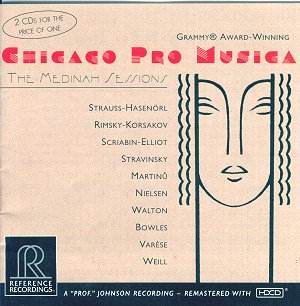|
|
THE
MEDINAH SESSIONS Works for sundry instrumental ensembles WALTON Façade Suite STRAUSS (arr Hasenöhrl) Till Eulenspiegel SCRIABIN (arr Elliot) Waltz in A flat NIELSEN Serenata in vano STRAVINSKY Suite The Soldier's Tale WEILL The Threepenny Opera Suite* PAUL Bowles Music for a Farce* MARTINU La Revue de Cuisine* VARÈSE Octandre* RIMSKY-Korsakov (arr Blackwood) Capriccio Espagnol Recently remastered, the original recordings (released as RR-16, 17 & 29) were made at the Medinah Temple, Chicago, in August 1983 and * in June 1988. |
Chicago Pro Musica is an ensemble drawn from the Chicago Symphony Orchestra. This 'two for the price of one' bargain CD offers an eclectic mix of original works and arrangements, all brilliantly performed and recorded with clarity and natural warmth. Occasionally you can hear the players drawing breath, which creates the delightful illusion of a live performance.
The programme note claims that the recording of Façade performed here is 'an exact rendering' of the 1922 chamber original. In fact the original was scored only for flute/piccolo, clarinet/bass clarinet, trumpet, cello and percussion: for the first public performance in 1923 Walton added alto saxophone, by which time he had also substantially expanded the score. Twelve of the best-known numbers are selected for this disc. Sparkling stuff, only lacking that last ounce of the composer's sly wit and intimations of 'sleaze'. Weill's Threepenny Opera Suite, Stravinsky's The Soldier's Tale and Martinu's La Revue de Cuisine are also brilliantly characterised. The influence of jazz is common to all these works and it surfaces again in the eight short movements of Music for a Farce (1938) by the American Paul Bowles (born 1910).
Nielsen described his Serenata in Vano (scored for clarinet, bassoon, horn, cello and double bass) as 'a humorous trifle', which indeed it is. I have to confess that Varèse's tortuous Octandre (1924) did nothing for me: a more informative programme note might have helped.
No less interesting than the original works are the three arrangements. Franz Hasenohrl's minimal version of Strauss's Till Eulenspiegel (1954) is a remarkable piece: lasting a mere eight minutes, it is scored for violin, clarinet, bassoon, horn and double bass only, yet it retains both the shape and character of the original. Easley Blackwood is a member of Chicago Pro Musica: he arranged Rimsky-Korsakov's Capriccio Espagnol for piano and eight other instruments: an ingenious curiosity.
These are highly enjoyable discs and warmly recommended.
Adrian Smith
